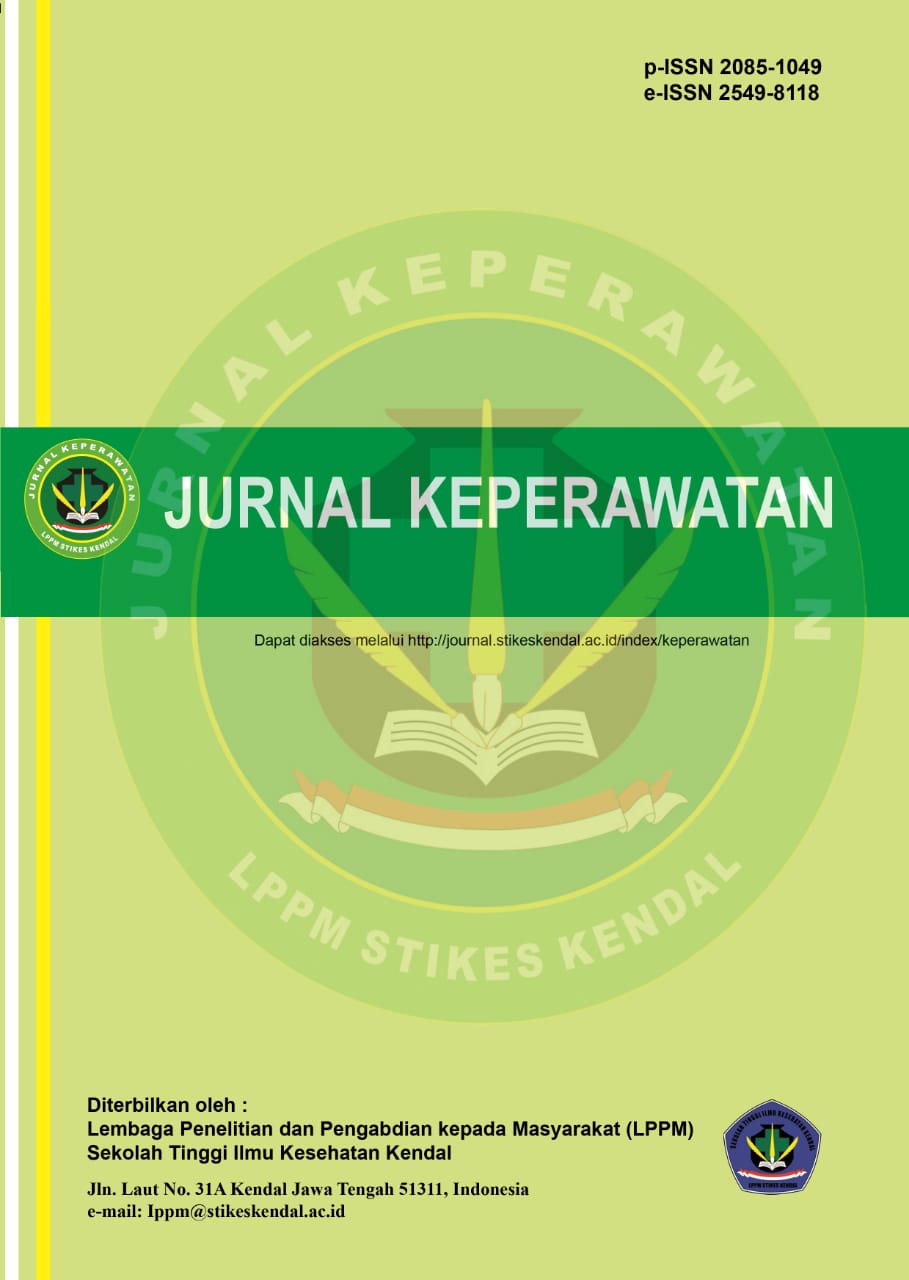Pengaruh Terapi Syukur (Gratitude) terhadap Kualitas Hidup Orang Dengan HIV/AIDS (ODHA)
DOI:
https://doi.org/10.32583/keperawatan.v15i4.1102Keywords:
HIV/AIDS, kualitas hidupp, terapi syukurAbstract
HIV/AIDS masih menjadi resiko kesehatan yang serius bagi Negara maju dan berkembang, karena hingga saat ini belum ditemukan obatnya. Adanya stigma dan diskriminasi terkait HIV/AIDS dapat mempengaruhi kualitas hidup yang merupakan faktor penting dalam menilai kesehatan dan kesejahteraan orang dengan HIV/AIDS (ODHA). Penelitian pre-eksperimental dengan rancangan one-group pre-post test design ini bertujuan untuk mengetahui pengaruh terapi syukur (gratitude) terhadap kualitas hidup ODHA di Poli VCT RSUD Waluyo Jati Kraksaan. 35 responden dipilih berdasarkan kriteria penelitian dengan teknik simple random sampling. Uji Wilcoxon dipergunakan dalam analisis data dan diperoleh p value sebesar 0.000<0.05 yang bermakna ada pengaruh terapi syukur (gratitude) terhadap kualitas hidup ODHA di Poli VCT RSUD Waluyo Jati Kraksaan. Diharapkan, perawat dapat memasukkan terapi syukur (gratitude) sebagai intervensi dalam asuhan keperawatan untuk meningkatkan kualitas hidup pasien.
References
Allen, S. (2018). The science of gratitude. In University of California at Berkeley Wellness Letter. John Templeton Foundation.
Baidowi, A. G., Khotima, K., & Andayani, S. A. (2019). Hubungan Dukungan Sosial dan Spiritual Penderita HIV / AIDS dengan Kualitas Hidup Penderita HIV / AIDS. Jurnal Ilmiah STIKES Citra Delima Bangka Belitung, 3(2).
BPS. (2021). Kabupaten Probolinggo dalam Angka (Probolinggo Regency in Figures) 2021. BPS KABUPATEN PROBOLINGGO.
Center for Disease Control and Prevention, C. (2021). HIV. Www.Cdc.Gov. https://www.cdc.gov/hiv/basics/whatishiv.html
Fauk, N. K., Ward, P. R., Hawke, K., & Mwanri, L. (2021). HIV Stigma and Discrimination: Perspectives and Personal Experiences of Healthcare Providers in Yogyakarta and Belu, Indonesia. Frontiers in Medicine, 8. https://doi.org/10.3389/fmed.2021.625787
Ford, M. T., Wang, Y., Jin, J., & Eisenberger, R. (2018). Chronic and episodic anger and gratitude toward the organization: Relationships with organizational and supervisor supportiveness and extrarole behavior. Journal of Occupational Health Psychology, 23(2), 175–187. https://doi.org/https://doi.org/10.1037/ocp0000075
Gesese, A. A. (2021). Predictors of Poor Quality of Life among People Living with HIV / AIDS on Antiretroviral therapy in Jimma zone Public Hospitals , South West Ethiopia : A Mixed-method Study. Research Square. https://doi.org/https://doi.org/10.21203/rs.3.rs-955136/v1 License:
Kemenkes RI Dirjen P2P. (2021). Laporan Perkembangan HIV AIDS & Penyakit lnfeksi Menular Seksual (PIMS) Triwulan I Tahun 2021. In Kementerian Kesehatan RI. https://siha.kemkes.go.id/portal/perkembangan-kasus-hiv-aids_pims#
Khademi, N., Zanganeh, A., Saeidi, S., Teimouri, R., Khezeli, M., Jamshidi, B., Yigitcanlar, T., Salimi, Y., Almasi, A., & Gholami Kiaee, K. (2021). Quality of life of HIV-infected individuals: insights from a study of patients in Kermanshah, Iran. BMC Infectious Diseases, 21(203). https://doi.org/10.1186/s12879-021-05908-z
Ko, H., & Kim, S. (2021). Nursing Students ’ Experiences of Gratitude Journaling during the COVID-19 Pandemic. Healthcare, 9(1473), 1–12. https://doi.org/https://doi.org/10.3390/healthcare9111473
Kyeong, S., Kim, J., Kim, D. J., Kim, H. E., & Kim, J. J. (2017). Effects of gratitude meditation on neural network functional connectivity and brain-heart coupling. Scientific Reports, 7(1), 1–15. https://doi.org/10.1038/s41598-017-05520-9
Megawati, P., Lestari, S., & Lestari, R. (2019). Gratitude training to improve subjective well-being among adolescents living in orphanages. HUMANITAS: Indonesian Psychological Journal, 16(1), 13–22. https://doi.org/10.26555/humanitas.v16i1.9196
Mills, P. J., Redwine, L., Wilson, K., Pung, M. A., Chinh, K., Greenberg, B. H., Lunde, O., Maisel, A., Raisinghani, A., Wood, A., & Chopra, D. (2015). The Role of Gratitude in Spiritual Well-being in Asymptomatic Heart Failure Patients. Spritual Clin Pract, 2(1), 5–17. https://doi.org/10.1037/scp0000050
Parker, M. E., & Smith, M. C. (2010). Nursing Theories and Nursing Practice (3rd ed.). F. A. Davis Company.
Platten, M., Pham, H. N., Nguyen, H. V, Nguyen, N. T., & Le, G. M. (2014). Knowledge of HIV and factors associated with attitudes towards HIV among final-year medical students at Hanoi medical university in Vietnam.
Reckart, H., Scott Huebner, E., Hills, K. J., & Valois, R. F. (2017). A preliminary study of the origins of early adolescents’ gratitude differences. Personality and Individual Differences, 116, 44–50. https://doi.org/10.1016/j.paid.2017.04.020
Relf, M. V., Pan, W., Edmonds, A., Ramirez, C., Amarasekara, S., & Adimora, A. A. (2019). Discrimination, Medical Distrust, Stigma, Depressive Symptoms, Antiretroviral Medication Adherence, Engagement in Care, and Quality of Life among Women Living with HIV in North Carolina: A Mediated Structural Equation Model. Journal of Acquired Immune Deficiency Syndromes, 81(3), 328–335. https://doi.org/10.1097/QAI.0000000000002033
Smith, M. J., & Liehr, P. R. (2014). Middle Range Theory for Nursing (3rd ed.). Springer Publishing Company.
Sztachańska, J., Krejtz, I., & Nezlek, J. B. (2019). Using a gratitude intervention to improve the lives of women with breast cancer: A daily diary study. Frontiers in Psychology, 10, 1–11. https://doi.org/10.3389/fpsyg.2019.01365
Tesemma, A. L., Abate, M. G., Abebo, Z. H., & Madebo, W. E. (2019). Determinants of poor quality of life among adults living with hiv and enrolled in highly active anti-retroviral therapy at public health facilities of arba minch town administration in southern ethiopia. HIV/AIDS - Research and Palliative Care, 11, 387–394. https://doi.org/10.2147/HIV.S227244
UNAIDS. (2017). UNAIDS warns that HIV-related stigma and discrimination is preventing people from accessing HIV services.
WHO. (2021). HIV/AIDS. Who.Int. https://www.who.int/news-room/fact-sheets/detail/hiv-aids
Yost-Dubrow, R., & Dunham, Y. (2017). Evidence for a relationship between trait gratitude and prosocial behaviour. Cognition and Emotion, 397–403. https://doi.org/https://doi.org/10.1080/02699931.2017.1289153.
Downloads
Published
How to Cite
Issue
Section
License
Copyright (c) 2023 Jurnal Keperawatan

This work is licensed under a Creative Commons Attribution-NonCommercial-NoDerivatives 4.0 International License.




